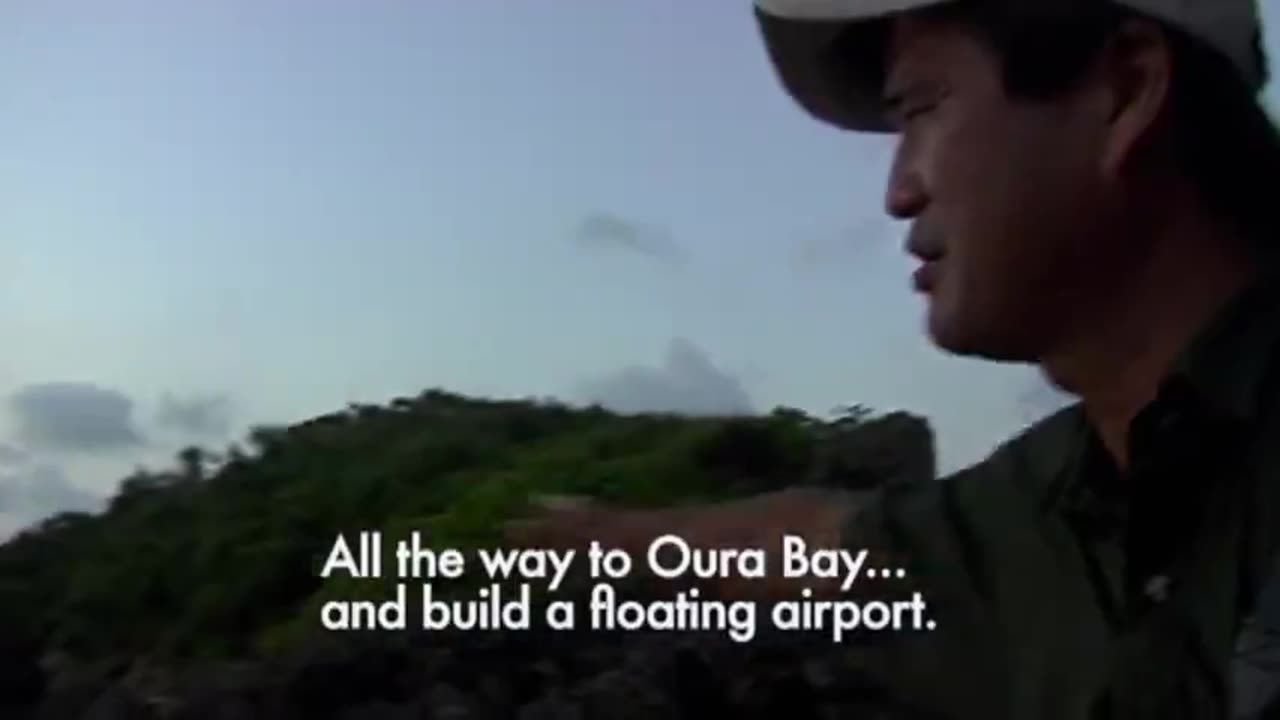Premium Only Content

Standing Army, 2010 - Full Movie
https://www.imdb.com/title/tt1543883/?ref_=fn_al_tt_1
https://www.youtube.com/watch?v=u0kR-2HAsMM
Over the course of the last century, the US has silently encircled the world with a web of military bases unlike any other in history. No continent is spared.They have shaped the lives of millions, yet remain a mystery to most.
Beginning in the 1980s, a belief has slowly taken over the world that neoliberal globalization with its built-in self-regulating mechanisms would finally do away with old institutions like the state and the military, and would usher the planet into an era of relative peace and prosperity. Free trade will bring on a great depression. 9-11 and the current economic crisis have shown that belief to be largely a myth, but many signs were already there. Markets have always relied on state power and military might. America's transformation from republic to economic superpower following World War II was accompanied by the creation of a global network of military bases, unlike any other in history. According to the Pentagon's base structure report, today these amount to 716 in 38 countries, more than 250,000 soldiers are stationed on these bases. In addition to this, the U.S. has a military presence in 110 countries around the world. A year after his election, Barack Obama approved the new administration's first military budget. This amounts to $680 billion, $30 billion more than Bush's last defense budget, and almost equaling the $787 billion set aside by the new administration for the economic crisis stimulus package. Why, despite the crisis, does the military budget keep growing? Are crises and military expansion related in some way? We only have different presentations or sometimes bands that come, or even when we have talent night, if we have people that want to show off their talent, we have a stage. We've done all sorts of things here from a Halloween party, there's Christmas parties, there's other events that happen here at the center as well. Yeah, they have salsa classes. In the early 21st century, military bases, the network of military bases all around the world, forms the new empire that the United States is trying to build. When you look at the Pentagon's website and their public information, they acknowledge having somewhere over 700 military bases scattered among about 130 countries. That's astonishing. That's astonishing. Most Americans have no idea. There are more than a quarter of a million, more than 250,000 U.S. troops stationed on these bases all around the world. It's not illegal to trade, but I got to respect the military. Those are the movies that we have, and the movies are free. The unit of empire in the classic European empires was the colony. The unit for the American empire is not the colony, it's the military base. Bases are the empire. They're the point of projection of power and expansion of power. Most people don't understand that the bases exist. I don't understand the functions of the military bases. And it's much, frankly, it's much easier for people to engage with things like atrocious war in Iraq, the question of torture, things that immediately outrage them. These are internet stations where soldiers can not only check the internet, but they also have the capability of doing webcams back home. To focus on war and not war preparation is to simply shovel after the elephant. One has to look at the war preparations that are going on around the world, which military bases are central to. If one doesn't pay attention to that, then, again, we can only deal with the symptoms, which is warfare. There's a saying that goes, when soldiers come, war comes. In the old days, they used to hit this bell with something like this. Oh, it's broken. Look at the junkies, they're all broken. The military bases are not only for the land, but also for the lives of people. They're for the culture and history of all people. You can't overlook that. They say they use the bases for the sake of the world, but there was the Korean War, the Vietnam War, or Iraq. If you look closely, they always kill people. To kill people, they use their own land. It breaks my heart. I cook, so if you ask me to lend you a knife, I'd say yes, but if you ask me to lend you a knife, I'd say no, because it's my land. I wrote in Japanese that it's my land, so give it back to me. World War II marked the birth of America's global empire of bases. For Germany, Italy, and Japan, the defeat was followed by the establishment of a permanent American presence that continues to this day. Nowhere is this clearer than in Okinawa, a little island south of the Japanese mainland, which after the war remained under US administration until 1972, when the island was returned to Japan. In those years, the US established dozens of military bases on the island. Today, along with South Korea, and due to its proximity to China and Taiwan, Okinawa still represents America's military stronghold in East Asia. The island hosts 38 US bases, which house a force of 35,000 soldiers. The growing tension between the US and the Soviet Union following the war led to an unprecedented global military buildup, and to a strategy of exploitation of people's fears that in various forms has continued to this day. You know how bad, Sunder? The atomic bomb flash could burn you worse than a terrible Sunder, especially when you're not covered. In those years, America expanded into new territories, first and foremost South Korea, which still hosts 26 major US bases. But not all new bases were the consequence of war. Some were the result of simple power politics. Such is the case of Diego Garcia, a small island in the Indian Ocean, part of the British Overseas Territories, whose inhabitants got caught up in the global power struggle. Nobody seems to know that Diego Garcia used to have a very considerable population that was all entirely bundled up and shipped out in order to, as the US Navy put it, sanitize the place. The US wanted a base in the Indian Ocean at all costs, because of the Cold War. Diego Garcia has the most wonderful lagoon that would really be the ideal place for a base. So we were at the wrong place at that time, because that place was the best place for the most sophisticated US, the nuclear base outside of the US and the UK. In 1971, due to an agreement between the UK and the US, the British made the island available to the Americans as a military base, because of its geostrategic position, and deported its 2,000 inhabitants. Today, according to the Pentagon, Diego Garcia is one of the 13 major US military bases in the world, and has played a crucial role in all post-911 conflicts. The Diego Garcia exiles today live scattered between Mauritius and the United Kingdom, where for years they have been fighting a legal battle to return to their island. In 2008, though, the House of Lords overruled all the cases previously won by the islanders, which upheld their right of return. We had to suffer exile for defence purposes, and we paid that price, and that price is to be exiled from your homeland, for the defence of the West. To a substantial degree, in one form or another, socialism has spread the shadow of human regimentation over most of the nations of the earth, and the shadow is encroaching upon our own liberty. Our business has continued to provide a better life for our increasing population, in spite of destructive forces which have pounded against our foundations of freedoms with no avail. However, wars, or the threat of wars, interrupt the normal operations of our competitive businesses. I was certainly a Cold Warrior. I thought that the Soviet Union was a menace. I still do. I still believe that we had every right to try and defend ourselves against the power of the Soviet Union. I began to change. I got new information after the collapse of the Soviet Union in 1991. Above all, how fast our country moved the United States to find a replacement enemy, to keep the military-industrial complex functioning, to serve the vested interests in the Cold War system. I was appalled by this. I believe that we should have had, after the collapse of the Soviet Union, eliminated any basis for this global apparatus. There was no further reason for it. It was irrelevant. Instead, they moved at once to find another enemy. China, terrorism, drug lords, even instability. Anything to keep it going. We need an enemy. It's like we were a football team, and we've been practicing to play a game. We've learned certain plays, and now we don't have any opponents. Now, how can we play this game anymore? And so they needed a new enemy. And the new enemy, well, for a while, it was drugs. We had a war on drugs. Well, then came terrorism, and that was a very good substitute in the minds of our leaders. Sometimes we're afraid of big things. Sometimes we're afraid of very little ones. But now there's something else about fear that I don't think you quite understand, Billy. What's that? Well, sometimes when you become afraid, there isn't anything that's really dangerous. Sometimes it's fake things that are dangerous when they're not. John Stockwell, a former CIA agent, wrote, I think, a very pressing book called In Search of Enemies, in which he identified different areas in the U.S. society where the propaganda machine was geared up to identify a particular enemy of the moment in order that the U.S. public would support a military buildup or support a particular war. So I think today we have, for instance, Chavez in Venezuela, who really hasn't worked out too well as an enemy. So I think they really had to go to Ahmadinejad in Iran. Before that, it was Ortega in Nicaragua and Khomeini in Iran. There was Ho Chi Minh and Castro, for instance. So there always has to be a set of enemies that justify U.S. military buildup, particularly at a time when, for instance, after the collapse of the Soviet Union, there was a danger that the U.S. public would no longer support continual war, continual military buildup. What then becomes the rationale for continuing to have these military bases, for continuing to have the military alliances, for a military budget that equals the rest of the world combined. What a worldwide network of bases means that you have at your fingertips, if you are the emperor of the West, are the means of a perpetual war. There's always somebody we don't like and somebody who must be stopped. Perpetual war for perpetual peace is being the American dream. Once we're launched upon empire, we will never look back and we will always find a pretext to attack an enemy. Targeting is an intricate process. Many things are considered. We have advanced weapon systems with precision munitions and we take care in matching the appropriate ordnance to produce the desired effect on the target. The foundations for the New World Order were laid in the Middle East in 1991. Following the First Gulf War, the U.S. established a permanent military presence in the Middle East, much like it had done 50 years earlier in Europe and East Asia. The true consequences of this policy would be seen only 10 years later. In 2001, Osama bin Laden cited the U.S. military presence in his homeland, Saudi Arabia, as a reason for his hatred of the United States. In a curious twist of fate though, the 9-11 attacks and America's military response paved the way for the birth of new military bases in Iraq and Central Asia, first and foremost in Afghanistan. The Pentagon's base structure report doesn't include the bases present in war zones or those considered politically sensitive, such as the ones in Israel. The actual number of U.S. bases around the world is thus much larger than the 716 admitted by the U.S. government. Before engineers and contractors can begin construction on buildings here at the 380th, they first need a good foundation to build upon. We are in charge of keeping the base clean, fence repair, concrete, pads. The heavy repair shop is currently working on pouring a concrete foundation for the base's new temporary gym. This job requires a whole unit to come together to get the job done. The relationship between bases and war is a hand-in-glove relationship. Bases, most of the U.S. bases, I would say the majority, are the result of war. They are the booty, or loot, of war, in the sense that they were captured during wartime and never given back. When a very large, burly man comes and makes you an offer you can't refuse, you end up with a military base. One of the main reasons the U.S. intervenes in various parts of the world is to add bases. Now, for example, following the U.S. bombing of Iraq in 1991, the United States wound up with military bases in Saudi Arabia, Kuwait, Bahrain, Qatar, Oman, and the United Arab Emirates. Following its bombing of Yugoslavia in 1999, the U.S. wound up with military bases in Kosovo, Albania, Bulgaria, Macedonia, Hungary, Bosnia, and Croatia. Following its bombing of Afghanistan in 2001 and 2002, the U.S. wound up with military bases in Afghanistan, Pakistan, Kazakhstan, Uzbekistan, Tajikistan, Kyrgyzstan, Georgia, Yemen, and Djibouti. Following its bombing and invasion of Iraq in 2003, the United States wound up with Iraq. Staying behind, I believe, is actually the ultimate purpose of many of these wars. We used to think of military bases being built in order to wage the wars, and I think increasingly we see the wars themselves as convenient opportunities to station the bases and to have a more permanent presence in countries such as Iraq, such as Afghanistan, such as Kosovo. What we have in here is video games. Well, the U.S.-Japan Security Alliance is the cornerstone of America's defense posture in the Asia-Pacific, and the United States is both a trans-Pacific and a trans-Atlantic power, but we couldn't project that power without the men and women who serve here in Japan. As we look at the region, it is at peace, but we have threats like what we hear every day from North Korea, and the security mission is essential to continuing to undergird America's leadership and being prepared for the kind of challenges we face, but also to seize the opportunities for a better future. In 2009, after years of local protests, U.S. Secretary of State Clinton signed an agreement with the Japanese government to move the 8,000 troops stationed in the Futenma Air Base to the island of Guam, a U.S. territory. The move, though, is tied to the construction of a new airstrip on the eastern coast of Okinawa, in Hinoko Bay. The project follows the decision to expand the Jungle Warfare Training Center in Pakai, further north. In short, the U.S. has agreed to return some land to the locals, but only if they accept to give up more land elsewhere on the island. We plan to build a 2,000-meter-long airstrip across the island of Guam. The U.S. has not taken any responsibility for the impact it has had on the environment and the lives of the local people. We want to build a new base, build a new ocean, and create a huge airspace. This is a place where precious creatures are living even in the eyes of the world, but the only unit in East Asia that is capable of destroying it It is said that only 50 of the isolated units are still alive today. This forest is called the Forest of Yanban. It is the only large forest in Okinawa. We want to make this nature ours. It is very strange that even though this is a Japanese country, the U.S. flag is still up and we are not allowed to enter here. The jungle warfare training center is only here now, and the U.S. does not want to let go of this place. This is the kind of place. In order to protect the Forest of Yanban, and in order to protect the lives of the local people, we continue to sit here. N4. This is 1, 2, 3, 4, 5, 6. These are the six helipads. Three are planned to be tested, but because we are sitting here, the construction has been stopped. For the past eight years, we have been doing this with the No New Base sign for about 50 to 60 years. At that time, we were talking to them about how to sell their tents. They are young people, so they didn't think that they could do this. We have to do this If we do something to stop this, we can't leave this place. We are old people, so we have to keep doing this. We have a lot of challenges, but we also have some real opportunities. And it's up to each of us to determine the role that we will play on behalf of our country and our leadership. But I have every confidence that when it comes to defending America's security and advancing our interests, we have nobody better than all of you. So thank you, and thanks to your families. Thanks for the service and the sacrifice, and thanks for making a difference every day. Many of us fuss over how we look. Some don't worry at all, and they're free to do that too. But only because others shape up, step forward, and serve our country. By militarism, we do not mean national defense or the obligation of citizenship for able-bodied people to defend the country in times of national emergency. We mean a way of life, a way of making a living, an ideological position. Originally, our conception of American military was like the early Roman legions of the Republic. They were raised for an emergency. Farmers left their fields, went to war, and were instantaneously demobilized. They were not long-service forces or any sort. As the Roman Republic slowly, inadvertently, thoughtlessly acquired themselves an empire, they began to realize they needed standing armies. Something like that happened in America after World War II, as we began to build an arms industry and an apparatus to support a huge standing army that subtly altered the political structure of the United States. The authors of the U.S. Constitution made a strong point that the military had to be under the control of civilian leadership, that they always would present a threat to democracy because they are not a democratic institution, they're an authoritarian institution themselves. And so, in general, when military institutions become more powerful, their hierarchical values, their authoritarian values come to dominate. And the claims of national security come to be seen as trumping the claims of democratic decision-making. This takes us back to probably the most famous warning in the history of the United States, George Washington's farewell address that used to be read at each opening session of Congress. And that is that the great enemy of republicanism, of republican liberty, is standing armies. Standing armies destroy federalism. They bring power to Washington, D.C. They require more wealth in order to maintain these armies. These are long-service armies, 20 years or so. They have to be taken care of when they become redundant. Things of this sort, it alters the power picture radically, and that's, of course, what ultimately brought down the Roman Republic. Attention all bases, attention all bases, this is Iron Hand. This is a sack alert. When we talk about the military-industrial complex, we have to include bases as a part of that complex. And observers have noted that there's something called a carry-on imperative. And the carry-on imperative is that institutional momentum, and it's based in part on profit, particularly when you privatize, there's a profit motive for these corporations who are helping to build and run the bases and provide the weaponry that is then stored at those bases. There's a huge number of corporations who are profiting by all of the equipment and the operations that go on. To protect the future of America, the defense techniques of tomorrow had to be discovered now. They were discovered in electronics. That is how sage and pristine computers enter military service. Electronics for combat means new concepts, new tools, new weapons. You are listening to the heartbeat of a sage computer. Every instrument in this room is constantly monitoring, testing, pulse-taking, controlling. Who owns this place? Who owns General Electric? They make gun bombs. Well, how do they get the money to make them? And who's giving it to them? And why? To protect us from what? These are all questions that somebody like Obama should have been asking himself. It just didn't happen in the empire. It was designed. And those bases just came along like, you know, some terrible cancer. When you see how much money is at stake in the operations that go on every day, it's phenomenal. The number of flights that take off from Kadena Air Force Base every single day in just that one base in that one country on one day will have involved thousands of gallons of jet fuel, repair and maintenance and parts for those aircraft. The rationale for these bases is that they're continually practicing and training and using the equipment and running the personnel through their bases and feeding them and so on. And that is an incredibly expensive operation. This is what President Eisenhower was warning against in his farewell address in 1961 when he invented the phrase military-industrial complex, meaning hidden power, power that was not really under the supervision of Congress and that was often out of control, represented private interests rather than the national interest. I'm sorry to say that we in America did not pay attention to the warning he gave to us and today it's close to out of control. Many companies that operate in the defense sector benefit from this system. One of these is KBR, tied to the former US Vice President Dick Cheney. In 1999, following the conflict in ex-Yugoslavia, KBR signed a multi-billion contract with the US Department of Defense to build Camp Bonsteel in Kosovo, one of the largest US bases in the world. One of the questions I get asked a lot is about Camp Bonsteel size and the General mentioned that. People ask me if Camp Bonsteel is the largest military installation in Europe for the United States. The answer is no. This is certainly a good base and able to support the mission that we have here and the troops, but as you can see, it is designed not to be permanent and should the time come that it's time for us to leave, we could pack this up and bring the buildings down. In Macedonia, just a few miles away from Camp Bonsteel and from the border with Kosovo, the US is sponsoring the construction of a pipeline called AMBO. The pipeline was initially conceived by a Macedonian architect living in the US and is today pursued by his son. My late father was a designer builder and architect of luxury contemporary states in New York State and Connecticut State in America. And he used to get this question a lot. What do you know about building a pipeline across three countries halfway around the world? And his answer was, look at the complexity of the houses I have designed and built and then ask yourself what is so difficult about digging a hole in the ground and putting a piece of pipe in it? And the answer, of course, is it's not difficult. What's hard about it is the politics. The AMBO project seeks to move between 35 and 45 million tons of oil per year for about $1.30 a barrel from the Bulgarian Black Sea port of Borgas to the Albanian Adriatic Sea port of Luri. The fact of the matter is, even $1.30 a barrel, it's a profitable pipeline and cheaper going through the Bosphorus Straits. So it's a real win-win situation, not only for the three Balkan countries, but also for the world. Everyone wins. It's a win for the environment. It's a win for the oil companies. It's a win for the countries. It has to be built. I want to very sharply and critically condemn anybody who suggests that Dick Cheney and Camp Bondsteel and Kosovo and anything has anything to do with this project is so independent of all this stuff, it's not even funny. And in the AMBO project in the beginning, I can tell you it's absolutely laughable. The assertions they make that Camp Bondsteel exists to secure the route of the oil pipeline project have nothing to do with it whatsoever. So let me be categorical about this, and I should know, because I've been there since the beginning. KBR, though, did not only build Camp Bondsteel. The company was also responsible for the AMBO pipeline feasibility study. And one of KBR's former managers is today CEO of AMBO Corporation. Are these simple coincidences, or is it a case of corporate and military interests working hand in hand? The United States consumes one fourth of the world's oil every day, more than any other country, far more than any other country. The US Department of Defense alone consumes as much petroleum as Sweden does on a daily basis. That's a huge amount that has to be procured day in, day out, 365 days a year. To safeguard that oil, the United States must have some capacity to protect it. And in this country, that job has been given to the military. And the military must have bases, naval bases, air force bases, and army bases in the areas where the oil is located or along the supply routes. If you look at the map collectively, there's an almost contiguous string of US military bases from Poland to Pakistan in this really strategic middle ground between the emerging economic competitors of the United States, the European Union on one hand, and China and Japan on the other. The US has a formal policy of maintaining military dominance of the Persian Gulf area. It's called the Carter Doctrine. After President Jimmy Carter, he said protection of the flow of Persian Gulf oil is a vital interest of the United States. And to protect that flow, we'll use any means necessary, including military force. To that end, he said, we will need military bases in the Persian Gulf area. And he established military bases to support this policy of protecting the flow of Persian Gulf oil. And then wars were fought as well in line with that policy. East and West are united in pioneering a new frontier of progress, serving the interests of the Saudi Arabs, serving the interest of the United States, and demonstrating the vitality of the American system of free enterprise. A system which, from this new frontier, is pumping into the trade of the world oil, one of the materials that is making a truly great contribution to our modern civilization. The reason, in fact, the primary one for the invasion of Iraq is to ensure US control over the major energy resources of the world. The embassy that's being built inside Baghdad is a city. It's like no other embassy in history or in the world. They're not building the embassy in the city of Iraq and the huge bases around with an intention to leave. They're building them with an intention to maintain control. We're not in the process of building bases in the Middle East. There will be an American base at Camp Victory. Right now, it occupies the whole area of the old Baghdad International Airport. There will remain something there. But in the Middle East, we are not going to develop strategic cooperation. Remember, a base is strategic cooperation. The model in the Middle East is you've got bad guys. So with bad guys, you don't sit there. You may bomb those countries, but you don't base there. The base I was located on was at Forward Operating Base Warrior in Kirkuk, Iraq. And while I was there, they had a brand new gymnasium built. They were in the process of starting a new dining facility. We had Burger King, Pizza Hut. We had our own coffee shop. It really became a joke that there was no qualms. People knew that if you're continuing to put this much money into things and you've got contractors who've been here for three years, four years, they just follow the military around wherever they go. These aren't things that I can see the US government just up and leaving and abandoning. And that's a lot of money that they put into some of these Forward Operating Bases in Iraq. Since 2003, the US has built dozens of military bases in Iraq. In 2008, the US and Iraqi governments signed an agreement that states that all foreign troops should leave the country by 2011. The agreement also says that the US will not seek permanent bases or a permanent military presence in Iraq. Obama's Secretary of Defense, Robert Gates, though, has stated that even after 2011, he expects to see several tens of thousands of American troops as part of a residual force in Iraq. Hence, many fear that Iraq may be used as a launching pad for future wars in the region. Often, in fact, bases created in response to an imminent threat have ended up becoming permanent. Diego Garcia, for example, born in the context of the Cold War, is still operational and has played a crucial role in the Iraq War. Our children are asking, where were you born, mom? What is your name? What was the country? What were you doing on this island? And when they think about strangers staying on these islands, and it's not them, it's not for them anymore. They say in their study, feasibility study, that, you know, the island is not safe for the people to go there, to return there. But the thing is, Americans are living there and they have developed the island. And I even heard, like, the island looks like a little New York. And Americans are enjoying their life. Why should we not have the right to go on our island and enjoy the same way they are doing? Known by many as the Navy's best-kept secret because of its remote location, Diego Garcia is actually home to about 3,000 residents at any given time. There's also a unique assortment of quality-of-life opportunities to take advantage of on Diego Garcia. The island's athletic center is open around the clock with a wide range of workout equipment and a full-size gymnasium. Be sure to spend as much time as possible researching this informative website to help you prepare for what will certainly be a memorable assignment abroad. When you try and think about who should be held accountable for the violence that's waged from U.S. military bases, I think there's plenty of responsibility to go around. It begins with U.S. elites who make plans without consulting the people of the United States about where these bases are going to go, and the elites of the countries in which those bases are located who make the decision to comply with U.S. requests for basing without consulting with their people. And in fact, there have been many critiques of the ways in which decisions are made between lower-level functionaries, in other words, that agreements are made that bypass the formal political structures of a country. By hosting U.S. bases, countries lose their sovereignty in a number of ways. For example, questions of crime. In Korea, a U.S. tank ran over two schoolgirls who were on the way to a birthday party, right? These soldiers were in the tank where their officers, no one was held accountable. You can do a very interesting kind of study in terms of the thickness of the SOFA, the Status of Forces Agreement. This is what's negotiated between the United States and so-called host nations. And it determines what kind of access the United States will have, what kind of political powers, what happens when U.S. soldiers commit crimes in these countries. And what you find is that the countries that have less power or leverage in relationship to the United States have much thinner SOFAs. In these countries, you'll find that when U.S. soldiers commit crimes, they're not held accountable. They're not tried under the law of the host nation. They're not put in prisons Often they're just brought out of the country back into the United States or deployed to a war zone because, as they say, boys will be boys, and these guys have been trained to be more aggressive, and so they were aggressive. You're like shot up with steroids, you know? I mean, you're working out every day, and you've got guns, you've got stuff, man. And so when you leave off the base, man, I mean, you're feeling pretty good about yourself, you know? I mean, you're feeling like you're a tough guy, you can kick anybody in the butt. So coming into town with that sort of attitude and getting kind of drunk, and then somebody looking at you the wrong way, you know, you just knock the hell out of them, you know? And, you know, you're a soldier, you're a Marine, I mean, they like that stuff. The military likes that stuff. They may say, well, we don't want our guys breaking local laws and causing problems for the local people. Bullcrap. That's garbage. I mean, if that's the case, then you don't let us off the base. You let us off the base, that's one of the issues. I heard on the news one day about a Okinawan girl had been raped by United States military men, and I was very upset over this because I remember how we sort of treated the Okinawan people when I was here as an 18-year-old. And eventually, some peace activists got in touch with me, and they had a contact here in Okinawa. And when they found out that I had been stationed here, they let the empty base people here know that there's an ex-Marine who was stationed here, who's doing peace work now in America. And so they invited me to come back to do a week of lectures. So that was 1996, and that's when I came back. And as we moved around the island and I saw the bases were still here, I just couldn't believe it. It's almost like a cancer here for these people. Since the end of World War II, these bases have been here. When I came here in 1966 to go to Vietnam, I don't even remember Okinawan people. I don't even remember seeing them. They were just shadows walking around. What I do remember is the women. I remember the drinking. I remember the fighting. That's what I remember. But in terms of Okinawan culture, I didn't eat their food. I ate cheeseburgers at the base. I didn't drink their alcohol. I drank Budweiser at the base. So this whole idea of Americanism stays within that base. It stays within the militarism of all ourselves. This is something Americans should know. What happens when we open bases in other people's country? What kind of problems does it solve? Or does it cause more problems? And I think it does. I think people get really angry at this idea that we are policing the world. We have a right to put bases anywhere we want. We don't have foreign bases in America. We don't have any British base. We don't have any Korean base. We don't have any French bases. We just have all American bases. For us, our bases are fine. The noise is our noise. It doesn't bother us at all because they're our bases. But for other people, it's a real problem. A CH-53 large helicopter from Tiananmen Square crashed into a building after it collided with a fire truck. CH-53? Actually, four years ago, a large helicopter crashed into a building It really was a disaster. It was an accident. There were no casualties. Tiananmen Square is surrounded by residential buildings like this. It's against American standards. When there are a lot of people, they get on the plane 40 times a day. It's a terrible plane. It's destroying the lives of the citizens. Another thing is that where they're flying is above the residential buildings. It's a risk of collision. In other words, when it's going to happen. The size of Tiananmen Square is not the actual size. It's about a meter here. It's around here. It's where the planes land. That's why they fly low-altitude planes. You can't see people's faces on a real helicopter. When it's noisy, it's from morning to evening. There was a night cry. The plane crashed into Okinawa International University and I thought it was scary. But I was able to escape on my own. But these kids are small, so we have to protect them. How do we protect them? It's scary. In 2007, the U.S. revealed its plans for a new military base in Vicenza, Italy, just a few miles away from the city's historical center. Vicenza already hosts a U.S. military base, the Caserma Aeterle, home to the Southern European Task Force and one of 10 major U.S. bases in Italy. The area designated for the new base is the ex-civilian airport Dalmolin. The plans for the new base include 48 buildings over 20 acres of land. The new base will host the entire 173rd Airborne Brigade, an elite combat force which has played a crucial role in Iraq and Afghanistan. Four people in Vicenza, three of whom are over the age of 90, and the base in Vicenza is nothing of a base. It doesn't generate smoke, noise. There are no planes landing. So anybody who complains of Vicenza, from my point of view, is a dirty commie, okay? Why? Because the Italian government, the region, the authorities have decided, yes, and they want to make a noise even though these are entirely harmless people. It's like having tourists. They don't have tanks. They don't have helicopters. They don't crash airplanes on your head. So it's purely ideological and negativist by a bunch of people who don't do anything and are worthless. In April 2008, Achille Valiati is elected mayor of Vicenza with the promise of holding a referendum on the new base. It is set to be held on October 5th, but just a few days before, the Italian Supreme Court blocks the referendum. Despite the court's decision, the citizens of Vicenza decide to hold an autonomous referendum and on October 5th, 95% of the participants vote against the new base. Despite the clear opposition of the people of Vicenza though, the Italian government gives the US the green light to go ahead with the new base. It's not unusual for the normal democratic process to be subverted when it comes to military bases. Most bases are in fact covered by secret treaties between the US and host nations. In Italy's case, this is the 1954 US-Italy bilateral agreement, never made public nor ratified by the Italian parliament. When you go to elementary school, you're taught the Declaration of Independence. And if you're paying attention on the day that it's taught, you'll be taught that it says that King George III kept among us standing armies in times of peace that committed abuses and usurpations. This is a language I can't make up. That this was a reason to declare independence from Britain and even to go to war. Obama's election was hailed by many in the world as the beginning of a political phase radically different from that of the Bush administration. And in many ways it has been. But the ever-growing military budget, the escalation of the war in Afghanistan, the uncertainty surrounding the fate of the US bases in Iraq, and the plans for new military bases in a number of countries show how hard it is for this or any other president to challenge those policies that benefit the military-industrial complex and perpetuate US hegemony over the rest of the world. We have been compelled to create a permanent armaments industry of vast proportions. In the councils of government, we must guard against the acquisition of unwanted influence by the military-industrial complex. The potential for the disastrous rise of misplaced power exists and will persist. In 1961, US President Eisenhower warned the world against the threat posed by the growing commercial interests of the arms industry, with its continuous need for new wars to survive. Today, 50 years later, his warning sounds more urgent than ever. The US must now choose. Will it invest in the country's dwindling resources to strengthen social and democratic institutions? Or will it continue to fuel this parasitical complex that by definition can only produce new weapons and new wars? The US must now choose. Will it invest in the country's dwindling resources to strengthen social and democratic institutions? Or will it continue to fuel
-
 3:12:28
3:12:28
tacetmort3m
15 hours ago🔴 LIVE - THIS GAME IS VERY FUN NOW - NO MORE ROOM IN HELL 2
27.7K -
 5:23:12
5:23:12
RalliedLIVE
12 hours ago $6.40 earnedWarzone Wins All Night w/ Ral
115K7 -
 8:25:59
8:25:59
RaikenNight
8 hours ago $0.67 earnedJumping on the Oblivion bandwagon!!
30.6K -
 1:30:55
1:30:55
Glenn Greenwald
10 hours agoPentagon in Turmoil Over Iran Policy as Israel Pushes for War; Lee Fang on New NIH Censorship Policy Threatening Medical Researchers | SYSTEM UPDATE #441
129K96 -
 53:01
53:01
Anthony Rogers
2 days agoEpisode 363
57.6K7 -
 1:15:04
1:15:04
Adam Does Movies
16 hours ago $1.17 earnedTalking Movie News + Blu-ray Giveaway + AMA - LIVE!
29.5K -
 55:31
55:31
BIG NEM
8 hours agoCharlotte Dobre & Mike Ricci on Going VIRAL, Making Money & Leaving the 9-5 Grind
25.9K1 -
 1:01:57
1:01:57
BonginoReport
11 hours agoTampon Tim’s Daughter: “Trump Would Have Deported Jesus” - Nightly Scroll w/ Hayley Caronia (Ep.31)
123K159 -
 4:04:28
4:04:28
Kim Iversen
12 hours agoEXPOSED: How Joe Biden Turned America into the Child Trafficking Capital of the World
103K60 -
 1:02:42
1:02:42
Sarah Westall
9 hours agoIs the Fight against China Real? Military Industrial Complex vs China w/ Dr. Rebecca Grant
46.6K14